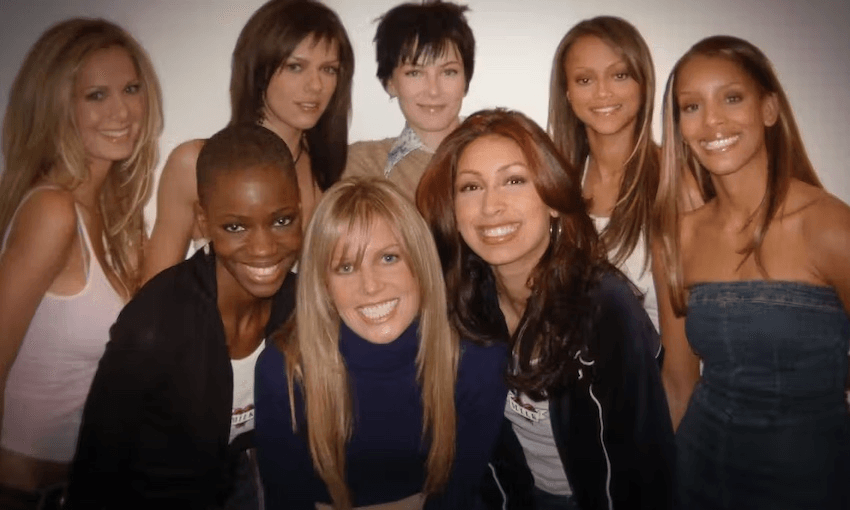The second season of the female-focused anthology series is as much a portrait of a disintegrating marriage as it is a crime story, writes Catherine McGregor.
This review contains mild spoilers for episodes one and two.
Hell hath no fury like a woman scorned, they say, but we all know it’s not actually true, not now and not 300 years ago, when those words were written. Men have made jokes about lonely, unloved women for centuries, just as they’ve dismissed women’s justifiable anger as shrewishness and jealousy. The men who sniggered knowingly at “a woman scorned” in 1697 are the same ones who share revenge porn and “bitches be crazy” memes with their mates in 2020.
No, that “hell hath no fury” line isn’t true at all – except when it is, as in the case of Betty Broderick who in her heartbroken, murderous rage exemplified every terrible stereotype about scorned women there is. Before her husband Dan left her, Betty Broderick – a real person, like the subject of Dirty John season one – was the early 80s suburban dream personified. Dan was one of the most successful lawyers in San Diego, and his million-dollar salary (in the early 80s!) was more than enough to support her and their four children. With her designer wardrobe and busy social calendar, she was what Americans call a “homemaker” – never a housewife. Life could have been perfect forever, if only Dan hadn’t fallen in love with his 20-something legal assistant, Linda Kolkena.
When Dirty John: The Betty Broderick Story opens, Betty and Dan are already separated. He’s trying to sell their marital home from under her, and she’s barely keeping it together. Her lawyer implores her to settle the divorce. “There will be times when you just can’t win, and you exhaust yourself, and you bleed out trying,” he tells her in a sublime moment of foreshadowing. She ignores him, just as she tries to ignore the fact that her husband no longer loves her, and once she can’t avoid the truth any more she explodes, slamming her car into Dan’s front door in a blind fury. Not long after, she takes a call from him in the psychiatric unit he’s had her temporarily committed to. She checks her reflection before picking up.
It all reads like high camp, I’m aware, and there’s no doubt that a story about love, madness and murder – set in the 1980s, no less – has the potential to be nothing more than a guilty, soapy pleasure. It certainly seems to be heading that way in episode one, which ends with a scene straight from a late-night potboiler. “Maybe I still think Dan will see reality for what it is,” Betty says tearfully. “But I can’t make him do that, I can’t make him wake up.” The camera pulls out; we see that she’s talking to a detective. “You can’t,” he says, with the air of a parent talking to a very confused child, “because he’s dead, right?”
It’s in episode two that we see the woman Betty Broderick once was. Played as an adult by Amanda Peet, with perhaps a little more sympathy than the real-life character deserved, Betty is kind, loving and smart – but programmed from birth to be a wife, and little more. For a woman like Betty, being a wife means being the ultimate cheerleader for her husband and his ambitions, even when she has four young children, a part-time job, and no help. Even when her husband, just out of medical school and finally on the cusp of earning an actual income, decides to abandon his medical career and go back to school, this time to study law. For years, hers is a life of drudgery and sacrifice, to be borne with a smile and not a hair out of place. In that time, in that world, that’s what wives did.
With both a medical and law degree to his name, Dan Broderick rises through the ranks to become a superstar medical malpractice lawyer. He’s not just good, he’s terrifying – as attested to by the expression on a doctor’s face when Betty mentions his name – and it’ll be interesting to see how future episodes address Betty’s claim that he was physically and mentally abusive to her for years before he died. On that note, a figurative bouquet of flowers to whichever casting director had the genius idea of putting Christian Slater in the role. Ever since his Heathers co-star Winona Ryder showed up in Stranger Things it’s become something of a Hollywood trend for period-set shows to cast cult actors from the same era, but Slater brings more to the role of Dan Broderick than just nostalgic Gen-X appeal. He’s always excelled at playing smarmy guys with a malevolent streak, and here he brings just the right amount of creepiness to an ultimately tragic character.
When Betty Broderick’s story first became public in 1989 it quickly became a true crime sensation. But for many women it wasn’t just a juicy tale, but a cautionary one too. Hundreds of them wrote to Betty, and to the newspapers that reported on her case, to say that they understood the impotent rage – at being used and discarded, then screwed over in divorce court – that led to the killings. “I believe every word Betty says – because I’ve been there,” read one letter. “Lawyers and judges simply refuse to protect mothers against this type of legalised emotional terrorism.” In the marriage of Dan and Betty Broderick, as in so many marriages, one person held all the power for decades. Until one day, he didn’t.
Dirty John: The Betty Broderick Story is streaming on Netflix now.



